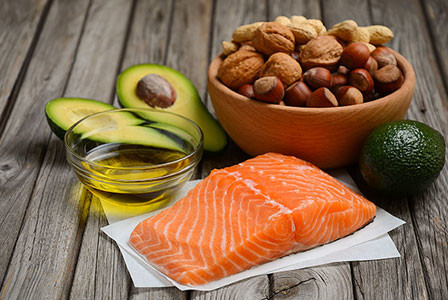Healthy Living » Healthy Eating
Living Heart Healthy

Healthy eating is an important part of taking care of your heart.
- Eat a variety of foods
- Eat vegetables, nuts and seeds, fruit and wholegrains
- Choose healthier, unsaturated fats including poultry, lean meats and oily fish to help lower your cholesterol
- Avoid processed, sugary, fatty or salty foods and snacks that can raise your cholesterol
- Drink water
- Limit the amount of alcohol you drink
- Keep a healthy body weight and shape
The low-down on fats
It’s important to remember that not all fats are bad. Dietary fat, which includes total fat and fatty acids, is a major source of energy for the body. In addition, dietary fat facilitates absorption of fat-soluble vitamins A, D, E, K, as well as other nutrients found in food such as carotenoids.Good or bad? Understanding the types of fats that affect our cholesterol.
Not all fats are bad! It’s about eating the right type of fats.
Eat foods with unsaturated fats instead of those with saturated and trans fats. Foods to eat: Fresh or frozen fruits and vegetables, whole grains, protein, which can include beans, lentils, legumes, nuts, lean meats, poultry, fish—and milk, cheese and yogurt. Foods to avoid: Fatty and processed meats, fried foods, baked goodsYour total cholesterol is made of two types:
Low density lipoprotein (LDL). This type of cholesterol is often referred to as ‘bad’ cholesterol because it can contribute to a buildup of plaque in your arteries. It can also increase your risk of CHD. High density lipoprotein (HDL). This is known as ‘good’ cholesterol because it can help protect against CHD. High or low? An easy way to remember which cholesterol should be high or low is to look at the first letter in its name:- LDL=Low
- HDL=High
Sources of 'good' fat
Sources of monounsaturated fats- Avocados
- Olive, peanut, canola oils and high-oleic sunflower oil
- Nuts such as almonds, hazelnuts, and pecans
- Seeds such as pumpkin and sesame seeds
- Corn, sunflower, corn, safflower, soybean, canola and flaxseed oil
- Walnuts
- Flax seeds
- Fatty fish and fish oils
- Canola oil – though higher in monounsaturated fat, it’s also a good source of polyunsaturated fat.
- Omega-3 fats are an important type of polyunsaturated fat. The body can’t make omega-3 fats, so you must eat them in foods. Sources include fish and plant sources such as walnuts, flax seeds, walnuts, and canola or soybean oil.
Sources of ‘bad fat’
Limit the amount of beef, pork, and lamb, butter, whole milk and fatty cheeses as well as coconut and palm oils; and eliminating egg yolks, organ meats and other sources of saturated fat from animals. Avoid processed, sugary, fatty or salty foods and snacks.Helpful diets to manage weight
Mediterranean diet usually includes:- Super Foods including fruits and vegetables, seeds, wholegrain breads and cereals, nuts, peas, beans and lentils, and fish
- Less saturated fats from red meats
- Moderate alcohol
- Less saturated fat from dairy and red meat sources
- Moderate alcohol consumption
- Soya foods
- Oats and barley
- Plant sterols/stanols are naturally found in a wide range of foods such as vegetable oils, nuts, seeds, whole grains, fruits and vegetables.
- Fruits and vegetables
- Foods rich in unsaturated fats such as olive, sunflower, corn, nuts and seed oil
Heart-healthy Recipes
Eating healthy isn’t always easy, but there are lots of great recipes available. Here are our top five (5) favourite heart-healthy recipes. Have a great recipe you’d like to share? Submit it below!- Corn, sweet potato and salmon chowder
- Lettuce fish tacos
- Chicken tikka masala
- Black bean chili with avocado
- Almond and lemon crusted fish with spinach
Click here to share a recipe.
